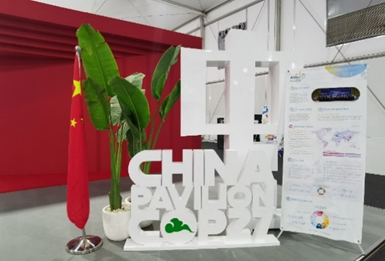The 27th Conference of the Parties of the United Nations Climate Change Conference (UNFCCC COP 27) took place in Sharm El Sheikh, Egypt from Nov 6 to 18, 2022. COP27 focused on the adaptation to climate change. Officials and representatives from 195 contracting parties, over 1300 media agencies and nearly 2,000 observer organizations participated in the discussions over 300 related topics, and the total number of participants reached 45,000.
ANSO and its supported Chinese research teams participated in the conference and organized three side events in the “China Pavilion”.
ANSO's Poster @ COP 27-China Pavillion
Part. 1: “Water Science and Technology Cooperation under Climate Change”
At the invitation of the Ministry of Ecology and Environment of China, the Research Center for Eco-Environmental Sciences (RCEES) of the Chinese Academy of Sciences (CAS), the Alliance of International Science Organizations (ANSO) and the CAS-WAS Centre of Excellence for Water and Environment (CAS-TWAS CEWE) held a side event both onsite and online on Water Science and Technology Cooperation under Climate Change at the COP27 “China Pavilion” on November 15 , 2022, to share the development experience and promote the international cooperation on water science and technology under the climate change. The meeting was chaired by Prof. WEI Yuansong from RCEES. Mr. ZHANG Huasheng, Scientific Counselor of the Chinese Embassy in Egypt, Prof. CAO Jinghua, Executive Director of the ANSO Secretariat, Prof. YANG Min, Deputy Director of RCEES, and more than 80 experts and scholars from Egypt, Thailand, Sri Lanka and China (including representatives from Tsinghua University, North China Electric Power University, etc.), attended the side event online.
Mr. ZHANG Huasheng introduced China’s major achievements in environmental governance in his speech. He said China would continue to actively promote global climate governance and commit efforts to jointly build a community with a shared future for mankind with its partners.
Prof. CAO Jinghua introduced the efforts and achievements ANSO has made in boosting international cooperation for the advances of the UN Sustainable Development Goals (SDGs), He emphasized that only through joint actions and in partnerships could humankind address common challenges such as climate change.
Prof. YANG Min made a keynote presentation entitled “Chinese solution for a better road to a better water”, summarizing the achievements of RCEES on water science and technology cooperation within the Belt and Road regions, and the prospects of the international cooperation surrounding the UN SDGs in the post-pandemic era.
Prof. WEI Yuansong introduced the cooperation experiences of China-Sri Lanka Joint Research and Demonstration Center for Water Technology. Prof. Islam Al Zayed from National Water Research of Egypt, Prof. Ahmed Tawfik from National Research Center of Egypt, Prof. Thammarat Koottatep from Asian Institute of Technology, Thailand, Prof. Rohan Weerasooriya from National Institute of Fundamental Studies, Sri Lanka, Prof. ZUO Jian’e from Tsinghua University, China, and Prof. LI Jiqing from North China Electric Power University presented reports respectively entitled “Rainwater Harvesting to Reduce Climate Change Vulnerability”, “Green Hydrogen Energy from Wastewater”, “Climate Adaptive Sanitation Systems”, “Water desalination”, “Applications of AI Technology in Urban Sewer Systems” and “Multi-objective Risk Analysis of Cascade Reservoirs in Yangtze River”.
Part. 2: “Climate and Civilization Development along the Silk Road – Learn from the Past”
The workshop on “Climate and Civilization Development along the Silk Road – Learn from the Past” was organized by ANSO Association for Trans-Eurasia Exchange and Silk-Road Civilization Development (ATES) and the Institute of Tibetan Plateau Research, Chinese Academy of Sciences (ITPCAS) on Nov. 8 2022. It aimed to present and discuss new findings of Chinese scientists in Trans-Eurasia exchanges and Silk Road civilization studies.
Prof. CHEN Fahu, Member of the Chinese Academy of Sciences (CAS), Director of the ITPCAS, and founding president of ATES, introduced the latest progress on the climate and environmental changes, and their effects on the development of Silk Road civilizations. Representatives of ATES Working Group delivered keynote speeches. Prof. GAO Xing from the Institute of Vertebrate Paleontology and Paleoanthropology, CAS, presented new evidence during the Paleolithic period in China, elaborating the context of the migration and cultural exchange of the Eurasian continent. Dr. MA Minmin from Lanzhou University, introduced the prehistoric trans-Eurasia communication process and its effects on the survival strategies of Chinese populations. Prof. CHEN Wei from the Institute for the History of Natural Sciences, CAS, compared historical technological achievements in China with countries along the Silk Roads. Prof. LIU Quanbo from Lanzhou University, emphasized the significance of the westbound literatures. Dr. CHEN Shengqian from the ITPCAS presented his integrated study on Holocene moisture change over Arid Central Asia (ACA).
Following the presentations, the participants discussed the development and scopes of ATES. Prof. CHEN Fahu emphasized that learning from the past is essential to coping with the threats from current climate and environmental changes. The prosperity of the Silk Roads in historical periods with active trans-continental exchanges is the best reflection for the pursuing of the shared future for mankind.
Part. 3: ANSO Collaborative Research: Achievements in Ganges-Brahmaputra-Meghna River Basin Shown in the China Pavilion of COP27
On November 6, 2022, the research team of ANSO collaborative research project entitled “Integrated Flood Services and Climate Change Adaptation for the Ganges-Brahmaputra-Meghna (GBM) River Basin” participated in the hybrid virtual meeting of the China Pavilion of UNFCCC COP27.
Associate Professor XU Ximeng, research group member, gave keynote speech entitled “Flood monitoring service in the Ganges-Brahmaputra-Meghna River Basin”. He introduced the Flood and Drought Risk Information Service System of GBM River Basin which has been established to provide quasi real time disaster information services, including soil drought, flood inundation depth and flood recurrence period for Bangladesh, Nepal, India and other countries. Associate Prof. HE Li, research group member, gave keynote speech entitled “Flood hazards and mitigation measures in the Ganges-Brahmaputra-Meghna River Basin”. She introduced the field investigation and disaster analysis of flood disasters in Melamchi, Nepal in 2021. This research revealed the causes of different types of flood disasters in Nepal, and proposed adaptive strategies according to local situations. The research results play an active role in flood and drought disaster prevention and climate change response in relevant “Belt and Road” countries and regions by providing disaster information services in the GBM Basin. It also helps supporting the realization of the UN SDGs and promoting the construction of a science and technology community with a shared future for mankind.
Thanks to contribution from: RCEES CAS, ATES and ITPCAS and Associate Prof. HE Li (heli@igsnrr.ac.cn).

